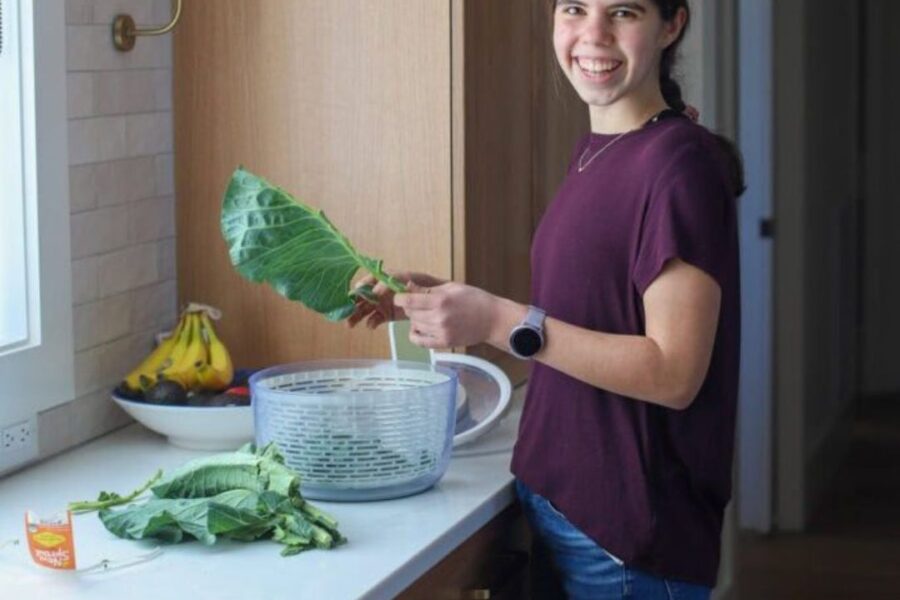When I first started this blog, I was writing during nap times when two little girls weren’t running around the house. These days? Those girls are growing up fast, and now I’m parenting a tween and a teen. Let me tell you, things have definitely gotten more complex. We’ve moved from “Don’t forget your shoes!” to “Let’s talk about making good choices and following through on commitments.” Two very different life stages, each stuffed with different valuable lessons in between.
One of the biggest things we’re focusing on these days? Responsibility. It’s one of those long-term, lifelong skills that’s so important to start encouraging early and keep building as young people grow. When we focus on raising responsible teens, we’re helping shape them into confident, reliable adults.
But here’s the thing… Teens feel like they’re stuck in the middle—they’re not quite kids, but not full-blown adults either. And honestly, that can be such a tough spot to be in. But one of the biggest differences between a teen and an adult is knowing how to take responsibility for your actions and be dependable.
Today, I’m sharing a few simple, real-life ways David and I are helping guide our girls through these teen years while building that all-important sense of responsibility. Because with the right support, encouragement, and a whole lot of patience, our hope is to raise kind, capable young adults who are ready to take on the world.

How to Teach Responsibility to a Teenager
Responsibility is one of those vital skills that can shape a young person’s entire future. It shows up everywhere—from school and friendships to work and how they see themselves. But let’s be honest, when we’re the ones in charge of teaching that responsibility? It can feel like a big task on our already full plates.
But, like anything in parenting—you don’t have to do it perfectly. (Thank goodness, right? And honestly, is there such a thing as the “perfect” method, anyways?). Most importantly, we don’t have to do it alone, either.
I’m sharing why teaching teens responsibility is so important, and how it doesn’t have to be hard! With a few practical tips, you can start weaving lessons of responsibility into simple, everyday moments. Whether you’re navigating chores, schoolwork, or those bigger conversations, these tips are here to help you raise confident, capable young people one step at a time.

Why is Responsibility Important in Teenagers?
Builds Independence and Self-Confidence
Raising my girls to be confident and independent is one of the most important things to me as a mom. I want them to really believe in themselves and their ability to handle whatever life throws their way. And, over the years, I’ve found that teaching responsibility is a powerful part of that.
When teens start owning their routines—whether it’s managing schoolwork, showing up for a part-time job, or just keeping track of their schedule—they begin to trust themselves. You can almost see that little lightbulb moment of “Hey, I’ve got this.”
The more they practice showing up for themselves, the more confident they become. And with more responsibility comes less reliance on us for every little decision—it’s very full-circle! Plus, they are way less likely to give in to peer pressure. That’s exactly what we want, right? Capable, confident kids who know their worth.
Prepares Them for Real-World Challenges
Responsibility is one of those life skills that never really goes away. Paying bills. Showing up for work. Washing your sheets every week. It’s just part of being an adult. That’s why the earlier we start to teach teens about responsibility, the better. It gives them time to let it sink in before they’re suddenly out on their own navigating “the real world.”
Because here’s the truth: Life after high school demands a whole new level of follow-through. Teens who have had practice meeting deadlines, following through on commitments, and taking ownership of their choices are going to be way more prepared for all the adult responsibilities to come.
Improves Decision-Making and Accountability
Responsibility helps teens connect the dots between their actions and the outcomes. They start to pause and think things through before diving in. And when something doesn’t go as planned? Instead of pointing fingers, they take ownership and learn from it all. It’s all part of building those problem-solving muscles they’ll use again and again.
Builds Trust in Relationships
Whether it’s with parents, teachers, friends, or someday coworkers and partners, responsibility shows people they can count on you. When teens follow through on what they say, they build trust and respect. And that’s without even realizing it. The earlier we start to encourage responsibility, the more likely they’ll grow into dependable, thoughtful adults. Naturally, people will look up to them and take note.

How to Teach Your Teenager Responsibility
Give them real responsibilities.
You don’t have to wait until the teen years to start reaching responsibility. Even little ones can start learning it early on. Start with small age-appropriate chores, and hold them accountable in a gentle, consistent way. Then, as they grow, those responsibilities grow too.
Let your teen manage their own schedule. Have them do their own laundry or help out with life tasks like running family errands. Once my girls start driving (time, feel free to go slowly with this one), I’ll be handing them the grocery list and sending them out to shop while I tackle something else at home.
When we give teens meaningful responsibilities—not just chores—they feel trusted, capable, and truly part of the family team.
Let them experience natural consequences.
One of the best ways to learn is by making a mistake. We hate to admit that as parents because we never want our kids to fail, but it’s the reality. And honestly, that’s a big part of teaching responsibility. Teens need to experience natural consequences to really understand how their choices impact the outcome.
Maybe they skipped studying and didn’t do well on a test. Or they didn’t practice for the game and ended up on the bench. Oof—tough moments, but important ones. As difficult as it may be, try not to step in and fix it. Let them feel the consequence—that’s where the growth happens.
Hold them accountable.
Teaching responsibility to teens means holding them accountable—and doing it consistently. That part really matters. If they agreed to babysit for the neighbors on Saturday night and then get invited to a party? Nope. They still need to follow through on that commitment… even if there’s some eye-rolling involved.
It might not make you the most popular parent in the moment, but it builds something even better—reliability and self-discipline. And those are life skills they’ll thank you for later (even if it takes a few years!).
Model responsibility in everyday life.
Monkey see, monkey do—welcome to parenting, right? Our kids (yes, even the teens) are always watching how we handle life. So if we want teens to learn responsibility, we’ve got to model it ourselves.
And I get it, we all have our moments. But it’s still important that our kids see us owning our actions. Even something as simple as- didn’t defrost the chicken for dinner? Time to pivot and opt for a last minute dinner idea. It’s not about being perfect. It’s about showing them what it looks like to follow through, stay calm, and take care of business.
When they see you handling life with responsibility, they’re way more likely to do the same.
Set clear boundaries and expectations.
Setting clear rules and expectations at home is such a great way to teach responsibility. Things like curfews or screen time limits (huge in our house!) help teens learn how to respect boundaries and stick to them.
But here’s the thing: it’s just as important to explain why the rules are in place. When your teen understands the reason behind the rule, they’re way more likely to respect it. It’s not just “because I said so,” it’s about helping them see the bigger picture.
Involve them in finances and budgeting.
When we encourage teens to learn responsibility, we can’t forget one major piece—money. Let’s be honest, plenty of adults still struggle with things like budgeting. That’s exactly why it’s so important for our teens to learn how to be financially responsible early on. (And why David and I take our State of the Family date nights seriously.)
The best way to involve teens in finances and budgeting is by giving them opportunities to earn their own money. Whether it’s a part-time job or an allowance for chores, when teens start to see the value of a dollar, they’re more likely to think twice about how to spend it. They’ll also grow into money-smart adults.
Praise their efforts, not just the outcomes.
One of the best ways to keep teaching responsibility is through positive reinforcement. When your teen steps up and shows they’re being responsible, let them know you see it.
And don’t just wait for the big end result—praise the effort along the way, too. Whether they’re sticking to their schedule, helping out without being asked, or owning up to a mistake, those little moments matter. Celebrate the progress, not just the outcome.
Encourage teens to practice responsibility and set them up for success!
Parenting teens is no walk in the park. There’s so much we want to teach them before they head off to college or take on the real world and it can start to feel like those milestones are coming faster and faster. And responsibility? That one’s a biggie. Starting early and staying consistent through the teen years can set them up for success in school, future jobs, relationships, and everything else in between.
If you’re into practical parenting tips, easy weeknight dinners, homeschooling inspiration, or just some good old-fashioned family fun, I’d love to have you join my newsletter or come say hi over on Instagram!
Loved this post? You might also enjoy:



Leave a Comment